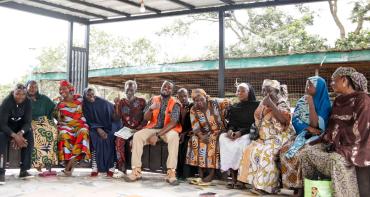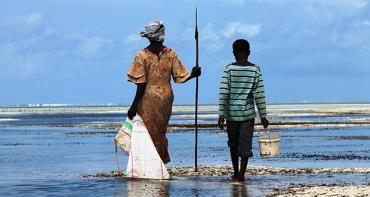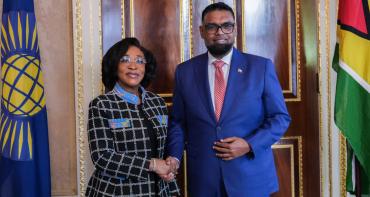The 4th Commonwealth Sustainable Energy Transition (CSET) Forum started today at the Commonwealth Secretariat at Marlborough House in London.

The four-day forum brings together government representatives, international partners, industry and youth organisations looking at the status of reliable, affordable and clean sustainable energy and the practical solutions to delivering a just energy transition across the Commonwealth.
The theme of this year’s forum is ‘A resilient and inclusive energy transition to foster sustainable development’.
Dr Arjoon Suddhoo, Deputy Secretary-General of the Commonwealth, opened the biennial event, calling on Commonwealth member countries to work alongside partners to mobilise the finance needed to ensure energy security for all its people. He said:
“The energy transition must be fair, uplifting all, from local communities and Indigenous Peoples to women and young people. Everyone should have a seat at the table. Finance is critical for countries so that they can invest in local industries that form the backbone of their transition.”
Dr. Suddhoo highlighted that energy security must remain a top priority at a time when geopolitical shifts are impacting the energy sector. A delegate from the UK echoed this sentiment, saying the “economic geography has changed”. Countries with extraordinary renewable endowments are not necessarily the same countries that had, or have, fossil fuel endowments.
The forum is held under the Chatham House Rule to encourage open debate. The UK delegate said that the UK finds itself in the same position as other Commonwealth countries in that energy bills are too expensive, and people do not like that.
Money for an energy transition must start flowing
Delegates raised concerns about “money not flowing”. There is a global figure of more than US$3 trillion required for an energy transition, yet Commonwealth member countries argue that the money is not coming to their countries in significant amounts.
A delegate from Ghana asked whether the CSET Forum would “talk about rhetoric or figure out how we can get money to flow to our countries across the Commonwealth?” He pointed to large industrial countries whose energy mix still includes fossil fuels, while developing countries are required to make swift plans to transition. He called for fellow Commonwealth countries to take a collective position on the issue.

A delegate from Sustainable Energy for All (SEforALL), an independent organisation hosted by the UN Office for Project Services (UNOPS), raised the bar and challenged Commonwealth delegates to find the solution.
“What if the family of Commonwealth nations pooled US$2 billion and created its own fund?”
SEforALL works with several Commonwealth countries and has success stories from Barbados and Ghana, with progress being made in Sierra Leone. The biggest challenge for these countries, in terms of securing an energy transition that is reliable and affordable, is in transportation.
Options on the table include incentivising the transition for consumers, for example, by using public spending for establishing electric vehicle public charging stations. Barbados will need more than 160,000 electric vehicles by 2035.
Conditions for workers are changing; industry must keep up
A presentation by the International Labour Organization (ILO) early on the first day was thought-provoking and exceedingly informative. A few realities include the fact that workers and the labour dispensation are predictably impacted by the renewable industry. For example, people earn 15% to 30% less in wages compared to the fossil fuel industry, and traditionally, the fossil fuel industry is better organised and unionised to secure better working conditions for workers.
There is also a tension between diversifying economies and developing sustainably and building the right workforce whilst transitioning. The delegate from the ILO said that it is not only the Minister of Energy in any country that needs to be considered, but also the Minister of Labour.
There were also ideas on the table to promote local components in the energy transitions, as well as the need to integrate gender equity into all energy transition initiatives, rather than treating gender as a standalone or added-on issue.
The CSET Forum concludes on Friday, 23 May.
4th Biennial Commonwealth Sustainable Energy Forum
More on the Commonwealth Sustainable Energy Transition Agenda
Media contact
-
Suné Kitshoff Senior Communications Officer, Communications Division, Commonwealth Secretariat
- M: +44 7740 450 901 | E-mail



